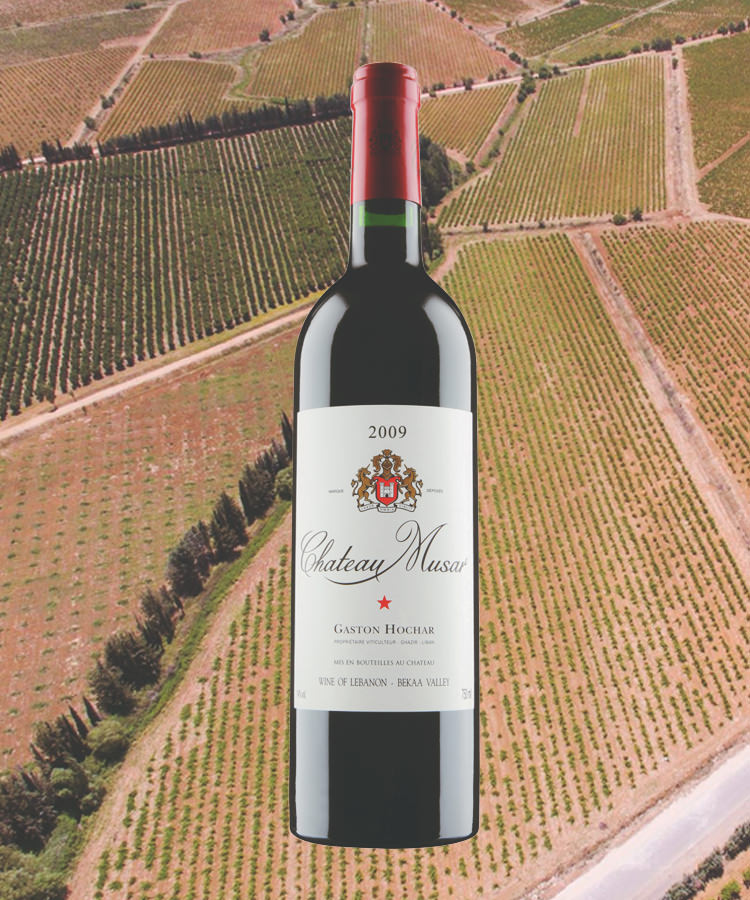In an industry beset by trends, Château Musar, an 87-year-old Lebanese wine producer, has garnered a cult following. It’s the only Middle Eastern wine offered by Thomas Keller’s legendary French Laundry restaurant in Yountville, California, and it displays prominently at New York City’s Rouge Tomate. Manhattan’s Terroir Tribeca has a dedicated section titled, “All Hail the Almighty Château Musar.” When winemaker Serge Hochar died unexpectedly in December 2014, he was mourned in almost every major wine publication. How did Château Musar become the sole Middle Eastern producer to earn a spot on the international stage of wine icons?
The Beirut-based Château Musar, founded in 1930 by Gaston Hochar, initially burst onto the international scene in 1979, when it dazzled attendees of the Bristol Wine Fair under the helm of Gaston’s son, Serge. A British favorite thereafter, it didn’t gain acclaim in the U.S. until around 2000, when sommeliers and wine lovers alike began clamoring for the non-interventionist, natural bottles of red, white, and rosé Château Musar.
While the key to Château Musar’s success is by no means singular, a simple reality set it up for success: It was available and actively marketed outside of Lebanon.
“The family’s foresight to sell the wines internationally and Serge’s very eloquent championing of them certainly has a lot to do with [the winery’s popularity],” says Christy Frank, wine buyer of Copake Wine Works in Copake, New York. For Musar’s first 40 years, the wine was largely consumed in its home country, but the 1972 onset of civil war almost eliminated that market. Serge, who continued to produce wine throughout the 20-year war, made a strong push for Château Musar in international markets.
But something caused wine professionals to fall head over heels for what was inside the Musar bottles and, counterintuitively, it was exactly what could have caused sommeliers to turn their heads in disgust: the unique, funky, savory, volatile, complex character of the wine.
“When you stuck your schnozz in a glass of Musar, there was no other wine on the planet Earth that tasted like it,” notes Paul Grieco, proprietor of Terroir Tribeca and Terroir on the Porch in New York. These were no ordinary wines. They were unusual and animalistic, dominated by non-fruit and earth, and until recent years, the “flawed” compounds of volatile acidity and brettanomyces. While many would call them pleasurable, few would call them approachable.
Fortuitously but not coincidentally, Château Musar hit the palates of U.S. sommeliers at the exact moment wine professionals were beginning to embrace funk. Natural and orange wines were growing in popularity. Of course not every wine professional jumped on the funk bandwagon, but Château Musar forced somms to take a definitive stance.
“It was so hyper-unique that you could not sit on the fence with that wine at all,” says Grieco.
While the taste itself was enough to endear the wine to many sommeliers, Château Musar had an added bonus: a remarkable story to tell, with an enigmatic person to tell it.
The story of Château Musar was inextricably linked to the Lebanese civil war and the Hochar family’s perseverance throughout the 20-year conflict. Despite years of violence and struggle, Château Musar only lost two vintages. The drama of this winery’s story was not lost on American buyers and sommeliers. What other winery’s vintage reports detail the impact of bombed-out roads on that year’s finished wine?
Serge Hochar proved to be an especially dynamic character, as likely to be described as a philosopher as a winemaker.
“[He was] a winemaker that made you think differently not just about his wine, but about the world of wine,” says Grieco. “You couldn’t attend a tasting with Serge, walk away, and not feel differently. It was impossible.”
Just as it’s unclear specifically how terroir affects a wine, it’s unclear how the essence of a man can speak through a wine. But somehow, for Musar’s fans, it absolutely does.
“The wines were like the man,” New York-based master sommelier Pascaline Lepeltier notes. “Serge understood humanity. The wines were imperfect but human.”
Sadly, violence and unrest in Lebanon’s Bekaa Valley presently challenge all of its residents, let alone local winemakers. Any question about the potential and diversity of Lebanese wines must first consider the complexities of the current climate.
In spite of these challenges,Château Musar distinguishes itself from many of the Middle Eastern wines available in the United States, which tend to be produced in a modern, New World style, with big fruit covered up by plentiful new oak. This is obviously a departure from the funky, distinctive style that has been Château Musar’s calling card for the better part of a century.
Moreover, it’s clear from the fervor surrounding Château Musar that, for today’s sommeliers and drinkers, the story matters. No matter how encapsulating the tale, however, the wine can only become truly legendary if the juice matches the tale. Château Musar brings both to the table.
